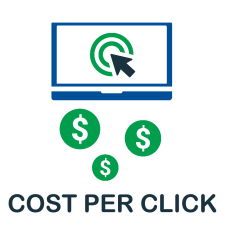CPC
Stands for "Cost Per Click."
CPC is a term used in online marketing that refers to how much an advertiser pays a website or ad network each time someone clicks one of their ads. It applies to ads displayed on search engine results pages, websites, social media, or anywhere else online. CPC is also known as PPC (Pay Per Click).
When advertisers want to run an ad online, ad networks have them bid against other advertisers by setting a maximum CPC. The maximum CPC is part of a formula that looks at the keywords and demographics targeted, the advertiser's industry, how relevant the ad is, and when the ad runs. After the formula selects which ad to run, the ad network charges the advertiser just enough to win the bid, often less than the maximum CPC.
The goal of CPC bidding, when compared to CPM (Cost Per Mille) bidding, is the focus on click-through rate, or CTR. Advertisers that use CPC bidding want people to click their ad to visit their website, often to sell a product or service. Advertisers using CPM bidding may instead just want their ads seen as widely as possible to build brand awareness without caring whether people click the ads.
 Test Your Knowledge
Test Your Knowledge